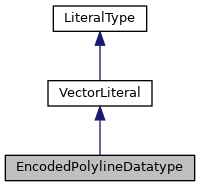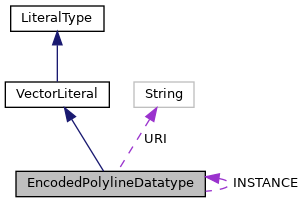WKTDatatype class allows the URI "geo:wktLiteral" to be used as a datatype and it will parse that datatype to a JTS Geometry. More...


Public Member Functions | |
| String | unparse (Geometry geometry) |
| This method Un-parses the JTS Geometry to the WKT literal. More... | |
| Geometry | read (String geometryLiteral) |
| String | toString () |
Static Public Member Functions | |
| static String | encodePolyline (final LineString linestring) |
| Encodes a sequence of LatLngs into an encoded path string. More... | |
| static List< Coordinate > | decodePolyline (String polyline, int precision) |
Static Public Attributes | |
| static final String | URI = POSTGIS.EncodedPolyline |
| The default WKT type URI. More... | |
| static final EncodedPolylineDatatype | INSTANCE = new EncodedPolylineDatatype() |
| A static instance of WKTDatatype. More... | |
Static Private Member Functions | |
| static void | encode (long v, StringBuffer result) |
Detailed Description
WKTDatatype class allows the URI "geo:wktLiteral" to be used as a datatype and it will parse that datatype to a JTS Geometry.
Req 10 All RDFS Literals of type geo:wktLiteral shall consist of an optional URI identifying the coordinate reference system followed by Simple Features Well Known Text (WKT) describing a geometric value. Valid geo:wktLiterals are formed by concatenating a valid, absolute URI as defined in [RFC 2396], one or more spaces (Unicode U+0020 character) as a separator, and a WKT string as defined in Simple Features [ISO 19125-1].
Req 11 The URI
shall be assumed as the spatial reference system for geo:wktLiterals that do not * specify an explicit spatial reference system URI.
Member Function Documentation
◆ decodePolyline()
|
static |
Referenced by EncodedPolylineDatatype.read().
◆ encode()
|
staticprivate |
Referenced by EncodedPolylineDatatype.encodePolyline().
◆ encodePolyline()
|
static |
Encodes a sequence of LatLngs into an encoded path string.
Modified from https://gitlab.com/aceperry/androidmapsutil Apache License 2.0
References EncodedPolylineDatatype.encode().
Referenced by EncodedPolylineDatatype.unparse().
◆ read()
| Geometry read | ( | String | geometryLiteral | ) |
Reimplemented from VectorLiteral.
References EncodedPolylineDatatype.decodePolyline().
◆ toString()
| String toString | ( | ) |
References EncodedPolylineDatatype.URI.
◆ unparse()
| String unparse | ( | Geometry | geometry | ) |
This method Un-parses the JTS Geometry to the WKT literal.
- Parameters
-
geometry - the JTS Geometry to be un-parsed
- Returns
- WKT - the returned WKT Literal.
Notice that the Spatial Reference System is not specified in returned WKT literal.
Reimplemented from VectorLiteral.
References EncodedPolylineDatatype.encodePolyline().
Member Data Documentation
◆ INSTANCE
|
static |
A static instance of WKTDatatype.
Referenced by LiteralRegistry.LiteralRegistry().
◆ URI
|
static |
The default WKT type URI.
Referenced by LiteralRegistry.LiteralRegistry(), and EncodedPolylineDatatype.toString().
